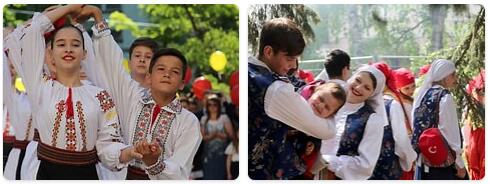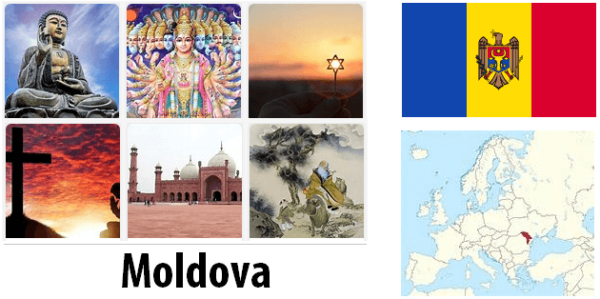The Moldavians are descended from Romanized peoples from the south of Eastern Europe. Chronicle writer Jon Skilitsa this year mentions 976 volojo people as Moldavian ancestors. In the middle of the 14th century, the Volojo of the northeast created a state, independent of the Hungarian kingdom, in southern Bukovina. The first gospodar (head of government) in the Principality of Moldova was Bogdán (1356-1374), although the Principality according to. the legend was formed by Dragos.
In the second half of the 14th century, the Moldavans detached themselves from Hungarian domination and from the Tartar Khan, while expanding their territory. Thus, in the early 15th century, Moldova had its eastern boundary on the Dniéster River, on the south by the Black Sea and Danube, and on the west by the Carpathian Mountains.

The small principality was within the sphere of interest of the larger surrounding states. These included Hungary, Poland, the Grand Duchy of Lithaun, Turkey and the Khanate of Crimea. The principality depended on Hungary, Poland and the Ottoman Empire. The official religion was the Christian Orthodox. The official language was called Church Slavic and was used not only during the religious ceremonies but also in the administration and in teaching. The Principality’s first capitals were Baya, Siret and Suchava. The population was predominantly engaged in cattle farming and the cultivation of wheat and wine.
The Principality of Moldova achieved a political and economic climax under the gospodars ‘ one Alexander Dobri the Good (1400-1432) and Stefan III the Great (1457-1504). During this period, the Principality waged wars against Hungary, Poland, and Crimea, but the biggest threat was Turkey’s expansion. Moldova was forced to pay taxes to the Ottomans, but when the Turks invaded the country in 1475, they suffered a staggering defeat at the Battle of Vaslui. Nevertheless, the relationship of strength was unequal, and in 1484 Turkey seized the territories surrounding the fortresses of Kilia and Belgorod, which they named the Turkish name Akerman. The so-called rayá ‘s were created – enclaves ruled by the Turks.
At the beginning of the 16th century, Moldova lost its state independence and recognized the Turkish Sultan, although it retained considerable autonomy within the Ottoman Empire. Turkish control over Bukovina lasted until 1775, when it was incorporated into the Austrian Empire. Besarabia remained under Turkish control until 1812 and the rest of Moldova until 1878. By the 18th century, Turkey had deprived Moldova one area after another, and by the middle of the century half of the country’s territory – between the Prut and Dnestr rivers – on Turkish hands.
The theft of land, the increase in taxes for the Turkish Sultans and the repeated invasions of Turks and Tartars that ravaged the Moldovan cities and villages acted as a stimulus to the anti-Turkish struggle. Gospodar ‘s one Petra Rares (1527-38, 1541-46), Ioann Voda Liuti (1572-74) and Dmitri Kantemir (1710-11) set off against Turkey. Moldova was therefore forced to ally with the great powers that were Turkey’s enemies. In 1711, Dmitri Liuti joined his Moldovan army with the Russian Peter the Great. In its fight against the Ottoman Empire, the country entered into agreements with Hungary, Austria and Poland, and from the late 18th century it began to approach Russia.
All the wars waged in the 18th and 19th centuries between Russia and Turkey somehow affected Moldova. According to thesciencetutor, the bargain expedition undertaken by Peter the Great in 1711 became a defeat for Russia and its allies Moldova, yet showed the Moldavians’ desire for secession – with Russian help. The Turks developed considerable distrust of the Moldavians and began deploying their own Fanar (suburb of Istanbul) princes. This practice continued in Besarabia until the early 19th century and throughout the rest of Moldova until 1821. Bloody wars between Russia and Turkey took place in the Moldavian territory (1735-39, 1768-74, 1787-91), and a considerable numbers of volunteer Moldavans fought in the Russian army against the Turks.
